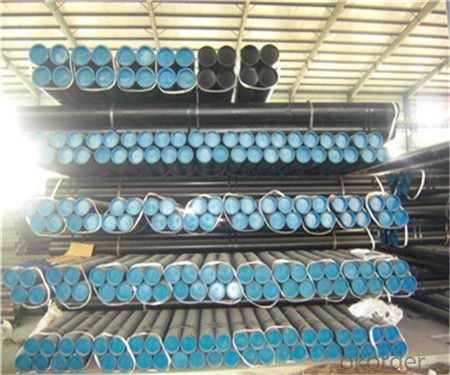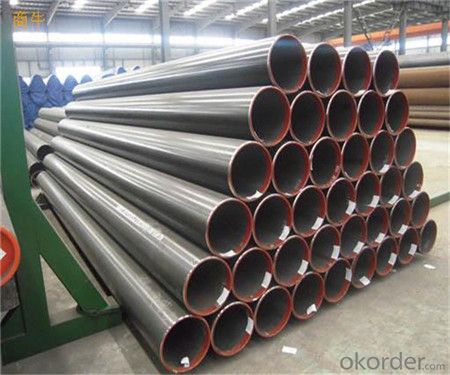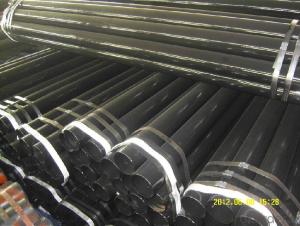Casing Seamless Pipe of Grade J55 with API Standard
- Loading Port:
- Tianjin
- Payment Terms:
- TT or LC
- Min Order Qty:
- 100 m.t.
- Supply Capability:
- 1000 m.t./month
OKorder Service Pledge
OKorder Financial Service
You Might Also Like
Product Details:
1. Commodity Name: Carbon Seamless steel pipe
2. Standard: API,GB,ASTM,ASME,DIN
3. Quality grade: 10#, 20#, A106B, A53B, API 5L B, Q235, Q345, ST37-2, ST 45, ST52.etc.
4. Dimension:
OD: 1/2"-24"
WT: 2.5-80mm, SCH10~SCH40~XXL
Length: 5.8m,6m,8m,9m,12m
5. Technique: Hot Rolled/Cold Rolled/ Cold Drawn
6. Application:
Carbon seamless steel pipes are widely used in gas, water and oil, transpotation;constructions;Bridge,highway,windows of model steel door; building materials;fences;heating facilities Fluid Pipe;conduit pipe,scaffolding pipe.etc.
7. Payment Terms: L/C D/A D/P T/T
8. Packing and shipment
Packaged in bundles,as per customers' requirements, it can also bepackagesd as beveled ends, typed marking, black painting, plastic caps protection,woven bags packing
For 20" container the max length is 5.8m; For 40" container the max length is 12m. other options are available based on customer requests. Please discuss when placing orders.
Packaging & Delivery
Packaging Details: | seaworthy package,bundles wrapped with strong steel strip |
Delivery Detail: | 15-30days after received 30%TT |
Seamless Steel Tubes Image


FAQ of Seamless Tube
①How is the quality of your products?
Our products are manufactured strictly according to national and internaional standard. If products’ quality don’t accord to discription as we give or the promise before you place order, we promise 100% refund.
②How about price?
We are factory and be able to give you lowest price below market one, and we have a policy that “ for saving time and absolutely honest business attitude, we quote as lowest as possible for any customer, and discount can be given according to quantity”.
③Why should you chose us?
Chose happens because of quality, then price, We can give you both.Additionally, we can also offer professional products inquiry, products knowledge train(for agents), smooth goods delivery, exellent customer solution proposals.Our service formula: good quality+good price+good service=customer’s trust
SGS test is available, customer inspection before shipping is welcome, third party inspection is no problem.
If you have any question, pls feel free to contact us !
- Q:How long do steel pipes last?
- The lifespan of steel pipes can vary depending on several factors, including the quality of the steel used, the environment in which they are installed, and the maintenance and care given to them. Generally, steel pipes are known for their durability and longevity. With proper installation and regular maintenance, steel pipes can last for several decades, often exceeding 50 years. However, it is important to note that external factors such as corrosion, exposure to extreme temperatures, and chemical reactions can significantly affect their lifespan. Regular inspections, timely repairs, and protective coatings can help extend the life of steel pipes, ensuring their reliability and functionality for many years.
- Q:What are the advantages of using steel pipes over other materials like PVC or copper?
- There are several advantages of using steel pipes over other materials like PVC or copper. Firstly, steel pipes are extremely durable and can withstand high pressure and extreme temperatures, making them ideal for various applications including industrial and underground use. Secondly, steel pipes have a longer lifespan compared to PVC or copper, reducing the need for frequent replacements and maintenance. Additionally, steel pipes are more resistant to corrosion and are not prone to cracking or leaking, ensuring a reliable and leak-free plumbing system. Lastly, steel pipes have a higher fire resistance rating compared to PVC, making them a safer option for certain environments.
- Q:How are steel pipes used in the oil and gas pipeline transportation?
- Steel pipes are used in oil and gas pipeline transportation due to their durability, strength, and resistance to corrosion. They are used to transport crude oil, natural gas, and other petroleum products over long distances. Steel pipes ensure the safe and efficient transfer of these resources from production sites to refineries and distribution centers, ensuring a reliable supply of energy for industries and consumers.
- Q:What does "SC50" steel pipe mean in civil engineering?
- SC50: laying on welded steel tubes of diameter 50mm. SC is usually used in electrical installation drawings.
- Q:What are the common factors affecting the lifespan of steel pipes?
- There are several common factors that can affect the lifespan of steel pipes. 1. Corrosion: Corrosion is one of the primary factors that can significantly reduce the lifespan of steel pipes. Exposure to moisture, chemicals, and harsh environmental conditions can cause the steel to rust and deteriorate over time. 2. Quality of materials: The quality of the steel used in manufacturing the pipes plays a crucial role in determining their lifespan. Higher-quality steel with better resistance to corrosion and other forms of degradation will generally have a longer lifespan compared to lower-grade materials. 3. Installation and maintenance practices: Proper installation and regular maintenance are essential for ensuring the longevity of steel pipes. Improper installation techniques, such as inadequate support or improper alignment, can lead to premature failure. Similarly, neglecting routine maintenance, such as cleaning and inspection, can accelerate the degradation process. 4. Operating conditions: The operating conditions to which steel pipes are exposed can also impact their lifespan. Factors such as temperature, pressure, and the type of fluid or gas being transported can all affect the integrity of the pipes. Extreme conditions, such as high temperatures or corrosive substances, can significantly reduce the lifespan of steel pipes. 5. Mechanical stress: Excessive mechanical stress, such as vibration, impact, or heavy loads, can weaken steel pipes over time. This stress can lead to cracking, deformation, or even complete failure if not properly managed or accounted for during the design and installation process. 6. Environmental factors: The surrounding environment can have a significant impact on the lifespan of steel pipes. Exposure to harsh weather conditions, such as extreme temperature variations or frequent freeze-thaw cycles, can accelerate the deterioration process. Additionally, the presence of pollutants or aggressive substances in the surrounding soil or water can also contribute to the degradation of steel pipes. In summary, the lifespan of steel pipes can be affected by factors such as corrosion, material quality, installation and maintenance practices, operating conditions, mechanical stress, and environmental factors. By considering and addressing these factors, it is possible to extend the lifespan of steel pipes and ensure their durability and reliability.
- Q:How are steel pipes used in the construction of oil and gas pipelines?
- Steel pipes are commonly used in the construction of oil and gas pipelines due to their high strength, durability, and resistance to corrosion. These pipes are employed to transport crude oil and natural gas from extraction sites to refineries and distribution centers. They provide a reliable and efficient means of transporting these valuable resources over long distances, ensuring a safe and secure supply of energy. Additionally, steel pipes are capable of withstanding high pressure and extreme temperature conditions, making them suitable for the demanding environment of oil and gas transportation.
- Q:Is there a weld on the outer wall of seamless steel tube?
- Seamless steel pipe, not seamless steel pipe, seamless steel pipe, welded seam, how can it be called seamless pipe?. Tell you a method: measurement of wall thickness, multi test several points, if each point, that is because it is cold drawn pipe, seamless pipe, hot rolling, wall thickness may% by sample.
- Q:How are steel pipes used in the construction of wind farms?
- Steel pipes are used in the construction of wind farms for various purposes, such as supporting wind turbine towers, providing a strong foundation for the turbines, and transmitting electricity generated by the turbines to the power grid.
- Q:What is the difference between steel pipes and concrete pipes?
- The main difference between steel pipes and concrete pipes lies in their composition and physical properties. Steel pipes are made from a combination of iron and carbon, which makes them strong, durable, and resistant to corrosion. Concrete pipes, on the other hand, are made from a mixture of cement, sand, and aggregates, giving them a solid structure and high compressive strength. In terms of installation, steel pipes are typically lighter and easier to handle, making them more convenient for transportation and installation. Concrete pipes, due to their weight and bulkiness, require heavy machinery or specialized equipment for handling and placement. Additionally, steel pipes have a smooth interior surface, which allows for efficient fluid flow and minimizes friction. Concrete pipes, on the contrary, have a rougher interior surface that can cause friction and impede the flow of fluids. When it comes to cost, steel pipes tend to be more expensive than concrete pipes, primarily due to the higher cost of raw materials and manufacturing processes involved. Both steel and concrete pipes have their specific applications and advantages. Steel pipes are commonly used in industries such as oil and gas, water supply, and construction, where strength and durability are crucial. Concrete pipes are often used in sewer systems, stormwater drainage, and culverts, where their high load-bearing capacity and resistance to chemical erosion make them suitable options.
- Q:How are steel pipes classified according to their wall thickness?
- Steel pipes are classified according to their wall thickness into three categories: standard weight, extra-strong, and double extra-strong.
1. Manufacturer Overview |
|
|---|---|
| Location | |
| Year Established | |
| Annual Output Value | |
| Main Markets | |
| Company Certifications | |
2. Manufacturer Certificates |
|
|---|---|
| a) Certification Name | |
| Range | |
| Reference | |
| Validity Period | |
3. Manufacturer Capability |
|
|---|---|
| a)Trade Capacity | |
| Nearest Port | |
| Export Percentage | |
| No.of Employees in Trade Department | |
| Language Spoken: | |
| b)Factory Information | |
| Factory Size: | |
| No. of Production Lines | |
| Contract Manufacturing | |
| Product Price Range | |
Send your message to us
Casing Seamless Pipe of Grade J55 with API Standard
- Loading Port:
- Tianjin
- Payment Terms:
- TT or LC
- Min Order Qty:
- 100 m.t.
- Supply Capability:
- 1000 m.t./month
OKorder Service Pledge
OKorder Financial Service
Similar products
New products
Hot products
Related keywords































